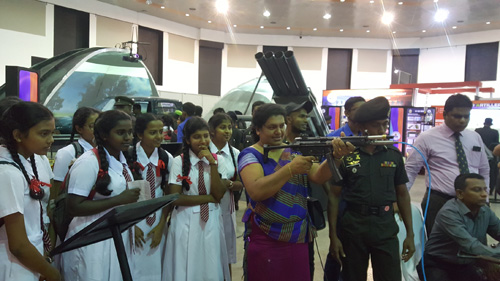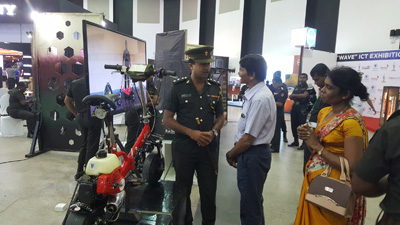Cyberspace: The next frontier for Sri Lanka Signal Corps
The Sri Lanka Army rolled out its big guns this week at its Cyber Security Symposium and Exhibition at the BMICH. Among the multi-barrelled rocket launchers and advanced artillery weapons on show was also a bicycle built for one – using a grass-cutting motor engine – which could be folded into three and stored in the boot of your car.

Guests trying out a new gun
Its innovator Captain Pubudu Dasanayaka tried to catch the eye of President Maithripala Sirisena who was Chief Guest at the opening ceremony of the event organised to mark the 75th anniversary of the Sri Lanka Signal Corps, one of the oldest regiments in the Sri Lanka Army.
President Sirisena didn’t have eyes for this bicycle built for one, perhaps apt considering the current political situation, leaving Captain Dasanayaka a trifle disappointed. But he perked up when the Business Times showed interest in his project rather than the surrounding stalls exhibiting hi-tech cyber products.
“I have been always interested in creating things which can be put to practical use even by civilians. In the past I built a car which could be driven by people who had lost their lower limbs,” explained Captain Dasanayaka, a member of the Research Analysis Projection and Development Branch.
If James Bond has the Q branch to supply his hi-tech gadgets, the Sri Lanka Army relies on this section to maintain its technological superiority which will be the decisive factor in warfare in the future.
While its budget is a fraction of what developed countries spend – the US Army’s research and development budget in 2017 was just over US$71 billion – it makes up for it with the wide range of ideas on show at the two-day exhibition useful for both military as well as normal everyday life.
Air gun
An old boy of St. Anne’s College, Kurunegala, Captain Dasanayaka once built an air-gun that could shoot a pesticide pellet which kills an insect detrimental to the growth of coconuts. So instead of having to climb up-and-down a coconut tree to treat the coconut flower with this pesticide, all you needed was good eyesight and steady aim – arrack lovers will surely raise a dram to him.
“As a child I was always building things. This bicycle can be used in the battlefield with a few modifications but its primary purpose is to help get around in crowded urban areas,” says the 32-year-old Army whiz-kid.

Captain Pubudu Dissanayake and the special bicycle.
Using the 35cc grass cutting engine, he has made a transport tool which can be folded in less than half-a-minute and stored in a bag. It weighs 22kg and has a maximum speed of 40kmph. It is economical with one litre of petrol taking you 70km. And it costs 25,000 rupees. He is now in the process of patenting the Folding Bee – “it makes a noise like a bee”– and is looking for investors.
Right next to the bicycle is an Elephant Repel System, using visible lights to warn the behemoths away from man-made killer-machines like the trains on the Northern Jaffna line.
A gaggle of schoolchildren from St. Joseph’s Girls School in Nugegoda are across the hall trying out their hand at shooting what looks like a Kalashnikov rifle at a target. The hits are recorded on a screen in front of you. “We came with our ICT teacher for this exhibition,” says one girl.
She points out to her teacher who is as taken up as her students and is aiming for the chest of the target.
More than 160 exhibits are scattered around, most of them by the Sri Lanka Signal Corps, with a few stalls given to the Sri Lanka Navy and Sri Lanka Airforce with others taken by private companies dabbling in cyber security.
A proud Major says: “Without us (Sri Lanka Signal Corps), the Army would be helpless. We provide and maintain the communications for the Army, and in this current age, this is the most vital arm of the Army.”
Formed before Independence in 1943, the Sri Lanka Signal Corps is a descendant of the Royal Corps of Signals (UK). Its main role is to develop and pioneer a state-of-the-art ICT support required for the command, control and administration of the Security Forces.
Nimesha Alwis and Neranjan Dissanayake man a booth which no one seems to be visiting. They work for Trend Micro, headquartered in Japan, which proudly announces they are experts at securing your journey through the Cloud.
“You want a safeguard against cyberattacks, then we are the people who can do it best,” says Nimesha, the regional Accounts Manager for Trend Micro.
Net security
In early 2017, the WannaCry ransomware attack, targeted computers worldwide. More than 200,000 computers were affected by the cryptoworm across 150 countries with total damages estimated at billions of dollars.
Neranjan does not disclose names, but he reveals two “large conglomerates in Sri Lanka also paid ransom.” Today, among their clients are the Sri Lanka Army, the Central Bank, Cargills Bank, Seylan Bank, DFCC, Dialog to name a few.
“We are the best in the business in providing cybersecurity,” adds Nimesha. Good to know, if you have millions in your account.
The symposium was not only attended by local experts on cybersecurity but also foreign military from Britain, Major-General Jon Cole, Director Information and chief information officer, British Army; India, Lt. General Rajeev Sabherwal, Signal Officer in Chief, Indian Army; Pakistan, Major General Hafeez Ur Rahman, Signal Officer in Chief, Pakistan Army; and Bangladesh, Brigadier General Shaikh Muhammad Rizwan Ali, Commander, 86 Independent Signal Brigade, Bangladesh Army.
“I am delighted to see a wider participation of scholars from local and foreign military institutions, universities and entrepreneurs involved in the cyber domain. This symposium will offer enormous opportunities to broaden the horizon in cyberspace-related challenges and threats,” said Major General B.H.M.A. Wijesinghe.
While President Sirisena didn’t wax lyrical, the Secretary, Minister of Defence, Hemasiri Fernando said: “In today’s context, the one who controls the cyberspace effectively will control the economic, military and social affairs in the future.
“Sri Lanka as a nation, needs to acquire technological sophistication to encounter possible threats in modern warfare which include cyber security, too,” added Mr. Fernando, lauding the work done by the Sri Lanka Signal Corps.


